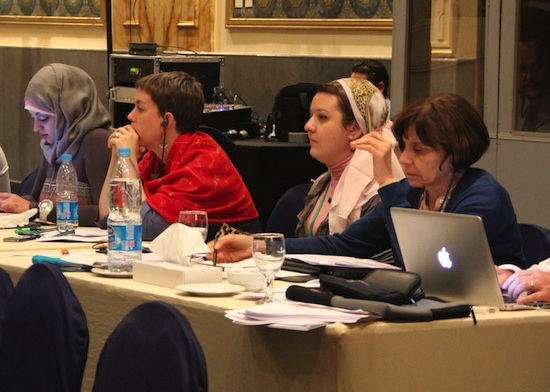Trials in Egypt and Tunisia: Can Transitional Justice Work in Unfinished Revolutions?
In the first session of the second day, Ziad Abdel Tawab, deputy director of the Cairo Institute for Human Rights, described the impact of the Mubarak trial in Egypt and the increasing pressure the military rulers are putting on human rights activists through military courts. Some 12000 civilians have been prosecuted by the military courts in legally flawed proceedings, in which the rights of defendants are not ensured. “The promise of Mubarak trial was a carrot, but the military is using the stick of its courts to crack down on the activists,” asserted Tawab.
Tawab added that there is no political will on the part of the military to put the real perpetrators of violence behind bars. He explained that judiciary is the only system that has managed to preserve some independence over the last several decades, but despite judges’ wisdom this is only relative independence. While the judicial system is in need of serious reform, the main problem is the interference of the executive power – which is in Egypt in the hands of the military - in the work of the judiciary.
So far Mubarak and members of his regime have not been accused of any crime outside the period of 25 January - 8 February 2011, he said. None of the violations of the past, including forced disappearances, constitutional and human rights violations have been prosecuted, except for some cases of corruption. This is an attempt by the military to show that the revolution was only about the corruption. The human, political and justice rights are not being addressed at all. “Egyptians are not only after food, but they want the full rights that they have struggled for,” he noted.

Omar Safraoui, general coordinator of a ‘25 Lawyers’ association in Tunisia, warned about the remnants of the former regime returning to the institutions through protocols and decisions of the interim government. He added that the Ministry of Justice saw its role significantly affected by the creation of agencies supposedly tasked with monitoring the work of the government, which in fact work to prevent having members of the former regime held accountable.
“We need to equip the system to employ transitional justice measures to deal with the crimes of repression and corruption, and we believe an independent court needs to be established, presented Abdel Nasser Al-Ouani, a member of ’25 Lawyers’. He added that a detailed proposal was presented to the government to set up an ad hoc court, independent from the former judiciary, that has on occasion engaged in covering up crimes of the former regime. The judiciary that has existed under Ben Ali cannot be trusted to do that job.
“Transitional justice should be immediate, because it should send a message that we are entering an era of justice,” stressed Al-Ouani . “However, our proposal was rejected and it is not clear how we will proceed, many people have already fled the country to avoid justice.”
Richard Rogers presented various problems in the functioning of military courts where in some cases large groups of people are tried in trials that last between 20-40 minutes. Apart from creating a parallel judiciary system that infringes on the rights of defendants, such practice is in direct contravention of a number of covenants and resolutions Egypt is a party to.
Rogers also addressed the role of victims in proceedings, stressing that the large numbers of victims and victims’ lawyers competing for time and voice in the courtroom are affecting the proceedings and undermining their credibility. He cited the Cambodian example where victims’ presence in the courtroom was limited after the start of a trial with more than 90 lawyers, which made the trial unmanageable.
Outreach is a crucial element of success for court proceedings of this kind, where it is explained to the people how the trial is conducted and particularly how the concept of fair trial benefits the society, he said.
Zakria Abdul Aziz, Egyptian judge and president of Criminal Tribunal, asked the attendees to think about a number of questions facing the judiciaries in Egypt and the region. Some judges may not be fully aware of the magnitude of what the task before them is when facing a legacy of a dictatorship. Prosecuting and trying political officials is very difficult and the rules are fairly unclear, maintained Aziz.
“Who should be the judges and prosecutors dealing with these cases in the aftermath of a revolution? The same who worked in the judiciary under the regime or some completely new people?” The revolution has removed the head of the regime, but its body has remained very strong in various ministries and institutions of the state. Can these people promote the values of the revolution which was against them is a big question, concluded Aziz.
The ensuing discussion raised a number of important issues leading worth a debate on how applicable transitional justice measures from other countries are in the Middle East and North Africa, especially in view of incidents like the execution of Moamar Gaddafi in Libya. The role of transitional justice measures other than criminal trials in Egypt and the region was explored, as well as the legal basis for transitional justice mechanisms in view of laws that shielded impunity under the old regimes.
The following session focused on the measures to prevent future abuses in Egypt and Tunisia.
